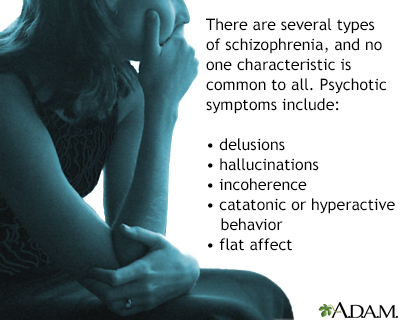Schizophrenia

What is Schizophrenia?
Schizophrenia is a severe mental disorder characterized by distortions in thinking, perception, emotions, language, sense of self, and behavior.
Who’s at Risk for Schizophrenia?
While schizophrenia can affect anyone, it most often appears in late adolescence or early adulthood. Risk factors include a family history of the disorder, certain genetic mutations, early childhood trauma, and drug use.
What Causes Schizophrenia?
The exact cause of schizophrenia isn't known, but it's believed to be a combination of genetics, brain chemistry and structure, and environmental factors.
How Does Schizophrenia Start?
Schizophrenia typically starts to manifest as a sudden change in behavior, which may be precipitated by a stressful or traumatic event.
What Are the Symptoms of Schizophrenia?
Symptoms can include hallucinations, delusions, disorganized thinking and speech, abnormal motor behavior, and negative symptoms like diminished emotional expression or lack of drive.
How is Schizophrenia Diagnosed?
Diagnosis is based on observed behavior, reported experiences, and reports from others familiar with the individual. A thorough diagnostic evaluation includes a complete medical and psychiatric history, physical exam, and laboratory tests.
How Can Schizophrenia Be Treated?
While there's no cure for schizophrenia, treatments – including medications, psychotherapy, and coordinated specialty care services – can help manage the symptoms.
What Complications May Occur with Schizophrenia?
Complications can include suicidal thoughts and behaviors, self-injury, substance abuse, health problems, and homelessness.
How Can I Prevent Schizophrenia?
There's no sure way to prevent schizophrenia, but early treatment may help get symptoms under control before serious complications develop.
Long-term Management of Schizophrenia
Long-term management involves medication, psychotherapy, life skills training, and supportive housing programs.
What is Recent Research Saying About Schizophrenia?
Recent research is exploring the genetic and environmental factors contributing to schizophrenia, and new antipsychotic medications and cognitive therapies are being developed and tested.
Where Can I Go For More Information on Schizophrenia?
For more information on schizophrenia, visit reputable health websites like the National Institute of Mental Health, the Mayo Clinic, or the American Psychiatric Association.

